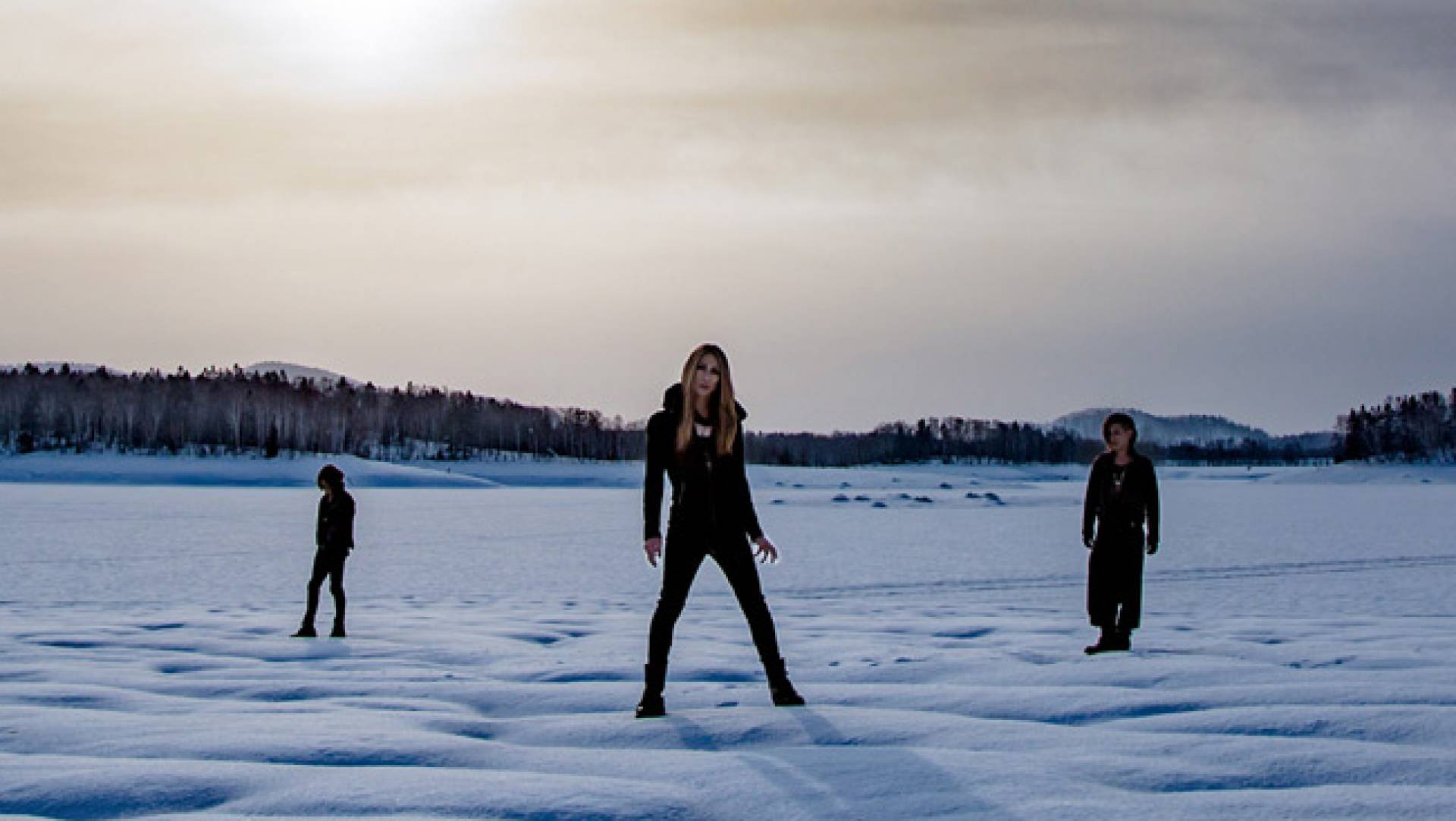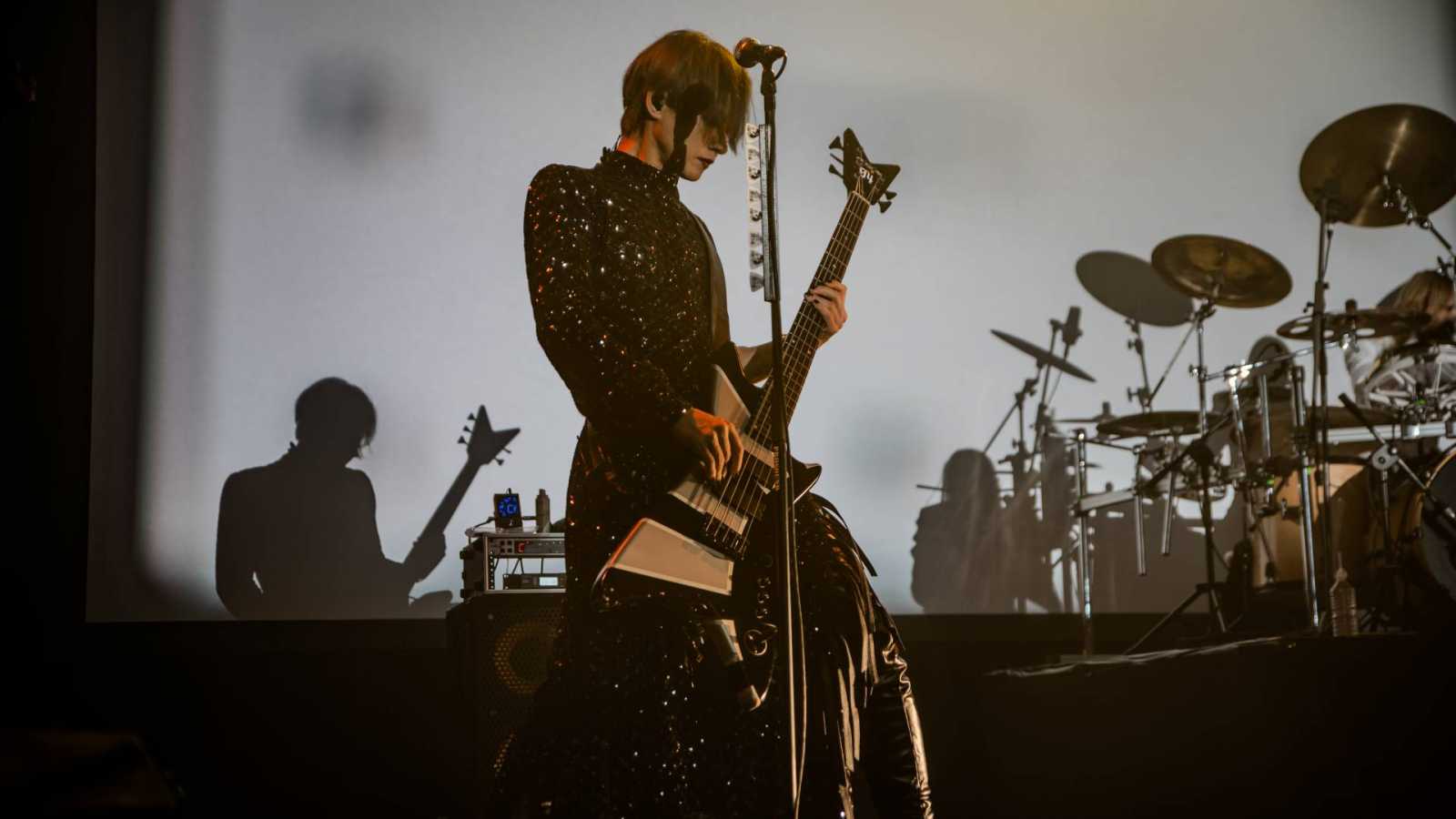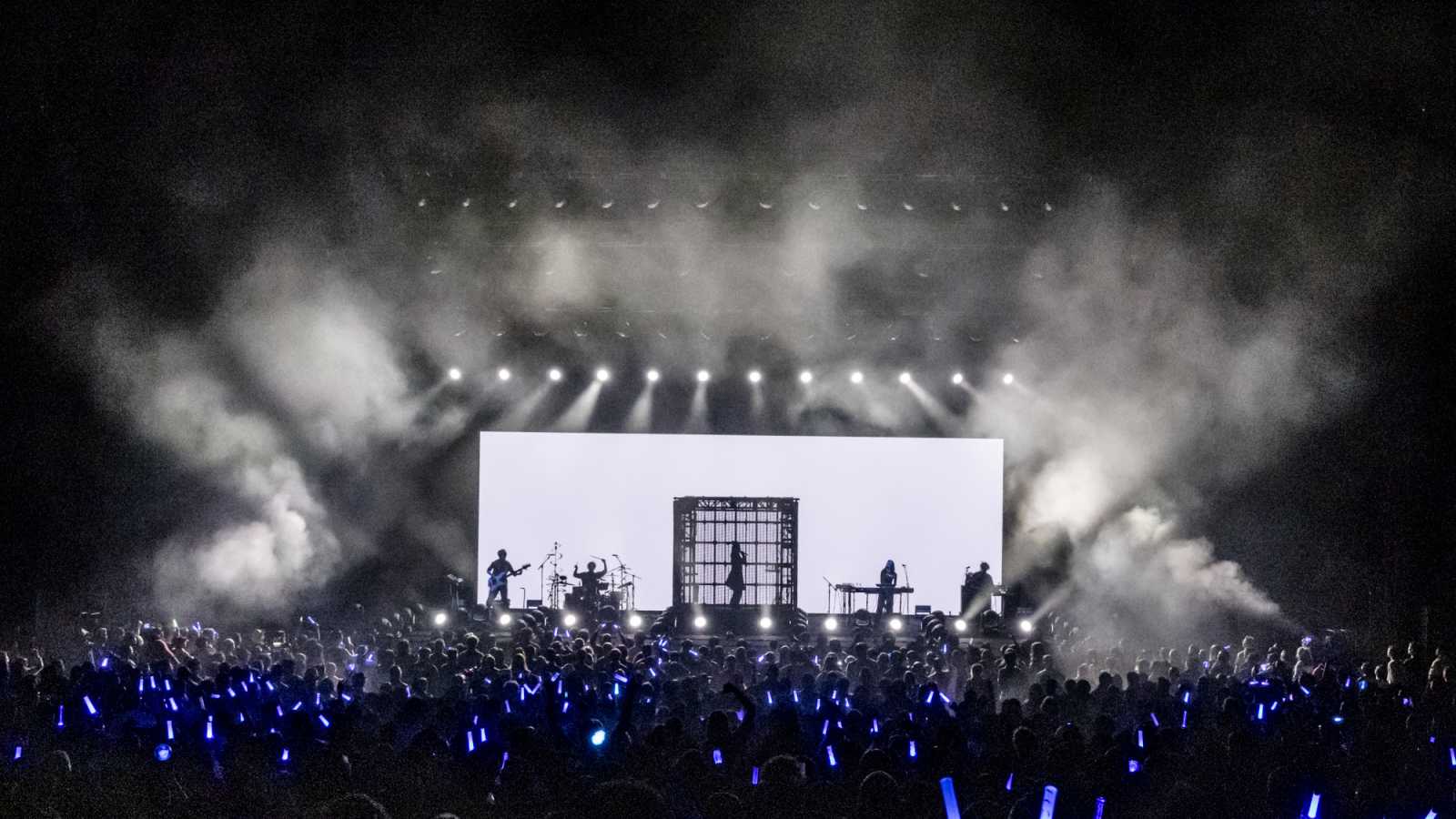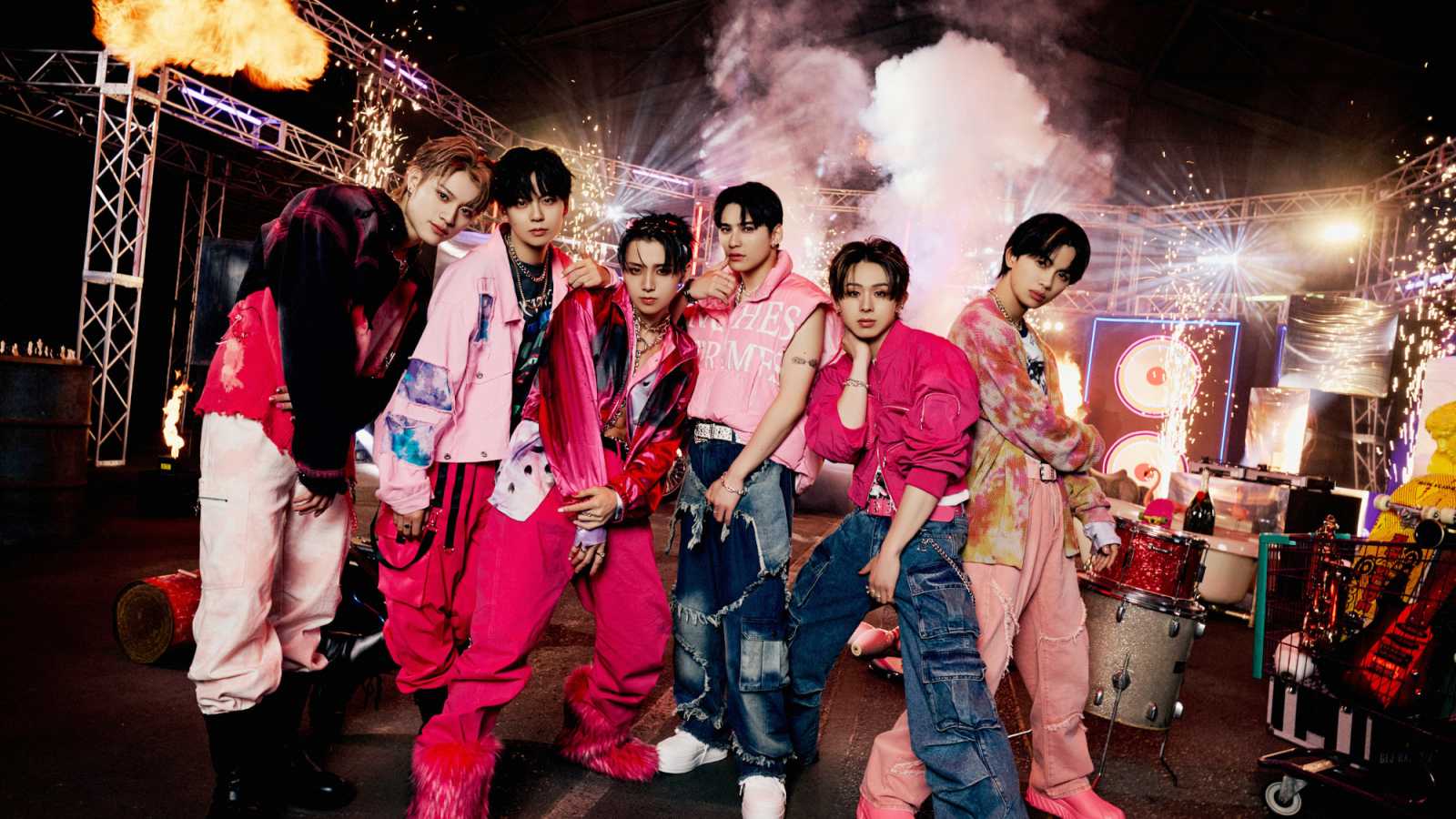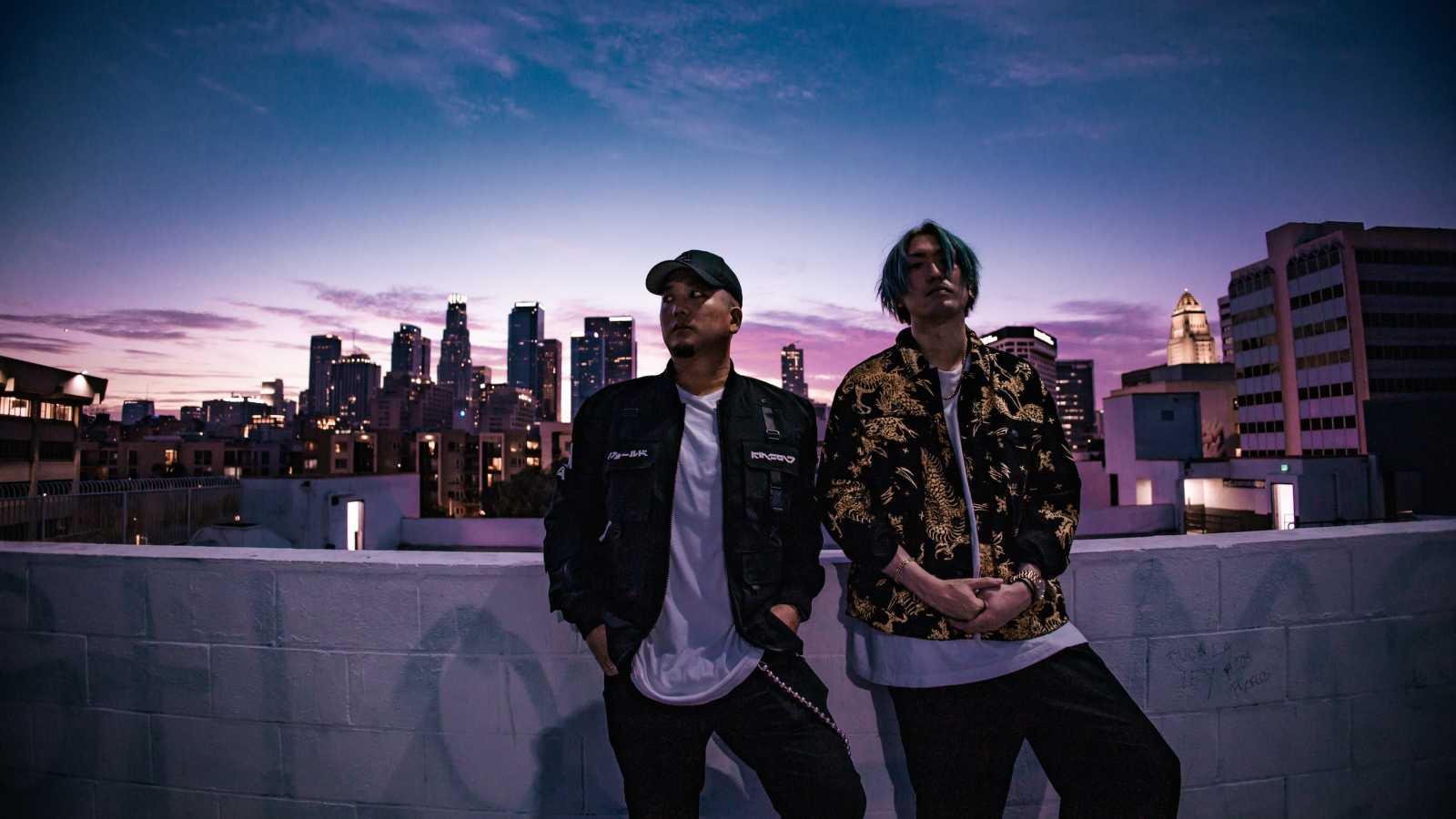A little over a month ago reporters from JaME's Polish section met up with the melodic death metal trio GYZE during the Pure Rock Japan festival held in Kawasaki. The band was the opening act of the metal festival, which has been running at irregular intervals for almost 20 years and this year also featured Aldious, Matenrou Opera and Galneryus. When the interview began, the guys had just come off stage after a very energetic and very well-received live. Tired and with smeared make up, they were still hyped up from the performance and eager to answer the questions, which mainly dealt with their experiences of rapidly becoming one of the most recognisable worldwide metal bands hailing from Japan.
Your last European tour, with Battle Beast and Majesty, was probably your biggest enterprise thus far. How did you like it? What was living in a tour-bus for a month and a half like?
Ryoji: Well, we did not stay in the same bus as Majesty and Battle Beast. We had our very own GYZE bus.
Still, you spent a month and a half on a bus. So, what was that like?
Ryoji: Actually, it was great. I could sleep there every day. I think other members would too …
Shuji: No! (Aruta or Ryoji laugh) I was sick every day.
Did they snore?
Shuji: Yeah, they were very noisy.
Ryoji: Oh really? (everyone laughs). He also said I punched his bed every night.
Ah, just like brothers do, fight in the night …
Ryoji: Ha ha, yeah. But there was no trouble and we became friends with Battle Beast and Majesty.
Did any concert or event from the tour stick in your memory in particular?
Shuji: The most memorable show was the one in France, in Paris. The location was on a ship, by the riverside. It was very beautiful and very different from Japan.
Aruta: For me it was also Paris. Manga often depicts French opera and French balls, so seeing all this really leaves a big impression.
Ryoji: My most memorable place was Barcelona. My first hero, when I was five years old, was Vega from Street Fighter and he was born in Barcelona. And Spanish fans are very crazy, very energetic. But we had a problem on stage in Barcelona, so it was even more memorable. I was so sad, I even cried after the show. But we played in Madrid the day after Barcelona and this time we could play perfectly, so it was great. Also, Metal Diver festival in Germany. And Poland too, of course! We have many fans in Poland; it was great. We talked to many of them after the show.
Coming back to Japan, in your last album, Northern Hell Song, you touch upon the subject of Ainu, the indigenous people of Hokkaido. Why did you use this theme?
Ryoji: We’ve been gaining the experience of a world tour since 2015, when we toured with Children of Bodom, Dragon Force and Carcass in Asia, and we went to Germany. We felt we had to promote our country. Heavy metal was born in Europe, so it’s European culture, and we love heavy metal but we still retain a strong identity of Japan, of Hokkaido, which is why we used Ainu’s – the native’s – language. But you know, our songs also have some elements of Enka, traditional Japanese pop music, and a little bit of Russian melodies too. Well, Japanese traditional pop was influenced by Russian folk songs, especially Showa pop. I studied the history of Japanese music, you know. This is why we put all of it there.
Well, you use the themes of Hokkaido, and generally Japan, in your music. Is this because of a strong relationship with your place of origin, or is that just an artistic motif?
Ryoji: Yes, we are proud of our hometown. Hokkaido is a very different island (from Honshu), it’s the northernmost island in Japan, so there is a lot of snow – it snows for nearly five months; it’s almost too much. There’s a lot of nature, different animals and trees. Everything in Hokkaido is different from Honshu. I am proud of my hometown, yes, even if our town doesn’t really have much real history, since it has only been around for a short time. You know, the Ainu people were originally from Siberia. They weren’t Japanese, then in the Edo period the people of Honshu began moving to Hokkaido and they introduced the culture of Japan as before these lands weren’t really Japan. We are Japanese, not Ainu, but we have a lot of respect for nature and for Ainu culture.
Northern Hell Song features voices from your fans and a guest guitarist …
Ryoji: Ah yes, the contest winner!
Did that make the recording of your album different?
Shuji: Of course, but it’s like that every day we do recording … well, I don’t like recording. That’s because Ryoji is very Spartan.
Ryoji: Yeah, I’m a dictator! When we start recording I turn into a real dictator (everyone laughs).
Shuji: Yeah, so for me recording time involves a lot of negative thinking. But the sound turned out very good, so in the end I’m happy.
Aruta: For me it wasn’t very different, but I think we did well recording with the fans. Now, the bonus track, Moonlight Sonata, was very difficult and tricky. But we managed to record it in one day, so I’m very proud. Other than that I don’t feel it was very different. It was a normal recording.
Ryoji: Yeah, I suddenly told them, "Send me data to Moonlight Sonata by tomorrow!" And Shuji thinks the same as Aruta too, I think. It was a very difficult track.
The album was only released in Japan so far. Can we expect a European release?
Ryoji: Our first and second albums were released in Italy. Unfortunately, we had very little promotion so we had to change labels. At the time we also had a Japanese label, so the first two albums were released under Victor Entertainment in Japan, but then Northern Hell Song was released under Universal Music. Actually, we are now trying to find a label in Europe, so if there are any good labels, please let us know (laughs). But yeah, nowadays there’s internet so, you know, record companies are in decline in every country, they don’t really sell that well, even in Japan too, especially in recent years, since the start of Spotify and Apple music.
The band’s line-up includes two brothers: Ryoji and Shuji. Do you think this relationship makes it easier for you to understand each other and work together, or quite the opposite, constant contact both in the band and in family situations causes additional tensions?
Shuji: We fought for a very, very long time. We are brothers, but he is also the leader, so I kept thinking “leader? brother?” But during the European tour we all had to spend time together and work together every day. I saw another Ryoji and another Aruta and I liked them more.
Ryoji: Yeah, when we started the band our relationship was bad, we kept fighting all the time, even on stage and in the studio, just all the time. He was just all, "Nope" (Shuji laughs). But that was before. Nowadays our relationship is very good, and with Aruta too – I feel like we’re almost family.
That was my next question to Aruta – doesn’t that make you feel a little strange, since the other two are brothers, like when they fight like brothers and you’re just there watching them?
Aruta: When I first joined the band, it was a bit scary. I had no idea what was going on since even during our second meeting these two were fist-fighting, but I got used to it, and I respect them as brothers and as musicians, and nowadays our relationship is good. There are no problems.
Ryoji: Yeah, the second time we met him, the two of us were fighting. Like, really fighting – punching, kicking, broken instruments and all.
Now, Ryoji, I know you enjoy fishing – that’s quite a surprising hobby for a metal musician – your music is fast and loud and your gigs very energetic, while I associate fishing with endless sitting in silence …
Ryoji: I don’t know why I like it. I like animals, especially snakes, lizards and fish. When I was a kid I would always search for animals and I learned to fish. Then, when I was 20 years old, I moved from Hokkaido to Tokyo, and I thought it was just too busy, all the buildings and the concrete. I missed the nature and the rivers, so I wanted to fish, to go into nature, in the mountains, and I already liked fishing before moving to Tokyo. Fishing is my life. Of course the guitar is too! And music! My guitar is almost like my family ... But fishing is my special thing. Last year I went to the riverside six times in one week and the other two also went to the lakes to fish.
Do you think there are some things which are common to playing music and fishing?
Ryoji: I think it’s because I can focus. That’s important, when I fish I’m very focused, and when I play on stage I’m also focused. It’s kind of the same, but fishing is more relaxing, and you don’t do this for show – when we play somebody is always watching us. So it’s a little different, and a little the same.
You’ve travelled a lot and already played a lot of shows and festivals. Are there still any events or places you want to play at but haven’t had the chance yet?
Shuji: Wacken and Hellfest.
Aruta: Tuska Open Air.
Ryoji: We have to play every metal festival in the world. This festival, Pure Rock Japan, is one of my ideal events, and the same goes for Summer Breeze which we played at last year. It was our ideal place. It’s like every year our dreams come true. Our dream now is to play Wacken on the main stage, as the headliner.
How about your musical inspirations? Do you usually listen to metal or other music?
Shuji: Journey! You know (starts singing: “don’t stop believing …”). And Rasmus from Finland.
Ryoji: There’s many good bands in Finland and Scandinavia. And I also like Behemoth too, from Poland.
Aruta: For me, it’s thrash metal and brutal death metal. I like Vader and Behemoth. And Decapitated.
Ryoji: My inspirations started with Enka, and classical music, especially pianists. Before I started to play music myself I was inspired by KISS. It was when I watched KISS’s videos I decided to become a rock star. Then I played in a punk rock band, and I learned classical guitar when I was eleven, and later electric guitar when I wanted to make a band. But yeah, for me it’s especially Enka. And I also like Slav music, traditional Russian and Ukrainian music (starts playing Korobeiniki on guitar). I take inspiration from that and put a little bit of this taste in our songs. For example, you can hear that in Blood Thirsty Prince (starts playing the intro), and this part (plays another bit) – it’s a bit Cossack. I’m always learning world music, right now I’m very interested in Tango and South American sounds.
And what are your plans for the nearest future? When can we expect to see you back in Europe?
Ryoji: We will play a big festival soon but that’s still a secret and I can’t say more. Maybe we will go back to Europe again. You know, we have a deal with Dragon Productions from Germany, and we want to be famous in Europe, the world and of course in Japan too! In the past, we didn’t play a lot of shows in Japan, only a few, so now we feel we have to tour in Japan more. Anyway, we want to play concerts every day. If you know any good events please let us know!
I think that goes well with Shuji. You said you don’t like recording in the studio, and said you prefer to play live, right?
Shuji: Yeah, my life motto is “no live no life”. My life is “live”.
Ryoji: For me, if I can go to the river every day when we’re touring, I can play a show every single day until I die.
Thank you very much!
JaME would like to thank Michał and Martin for their help with this interview.
